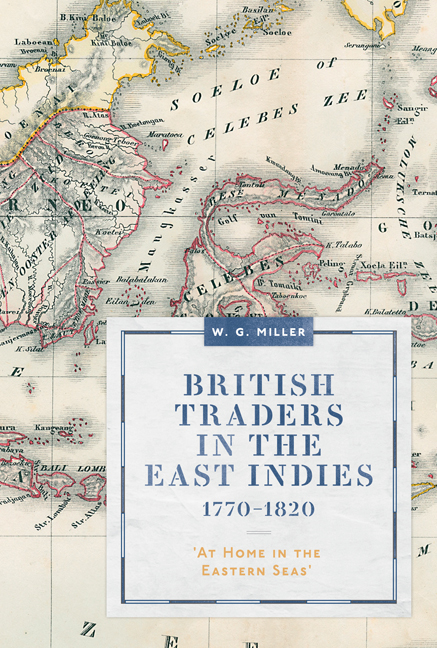Book contents
- Frontmatter
- Dedication
- Contents
- List of illustrations
- Preface
- Acknowledgements
- A note on orthography and unit conversion
- Abbreviations
- Map
- Introduction: the Indian origins of the British country trade
- Chapter One Merchant friends: country traders and the Malays I
- Chapter Two Political allies: country traders and the Malays II
- Chapter Three Inadvertent imperialists: country traders and British officials
- Chapter Four Smugglers and enemies: country traders and the Dutch
- Chapter Five The decline of the country trade in the Malay Archipelago
- Conclusion
- A note on sources
- Bibliography
- Index
- WORLDS OF THE EAST INDIA COMPANY
Chapter Two - Political allies: country traders and the Malays II
Published online by Cambridge University Press: 16 September 2020
- Frontmatter
- Dedication
- Contents
- List of illustrations
- Preface
- Acknowledgements
- A note on orthography and unit conversion
- Abbreviations
- Map
- Introduction: the Indian origins of the British country trade
- Chapter One Merchant friends: country traders and the Malays I
- Chapter Two Political allies: country traders and the Malays II
- Chapter Three Inadvertent imperialists: country traders and British officials
- Chapter Four Smugglers and enemies: country traders and the Dutch
- Chapter Five The decline of the country trade in the Malay Archipelago
- Conclusion
- A note on sources
- Bibliography
- Index
- WORLDS OF THE EAST INDIA COMPANY
Summary
In addition to having a commercial relationship, on occasion the cooperation that existed between the country traders and the principalities of the Malay Archipelago from 1770 to 1820 developed a political character. The politics of trade, “was a labyrinth presenting countless difficulties”. Despite the paucity of sources, it is clear that a number of country traders became active participants in local politics as a consequence of their trading activities. We shall examine in more detail the decisive role of country traders in the history of four Malay states: Johore, Kedah, Tidore and Mempawah/Pontianak.
As previously mentioned, it was a time of political insecurity in many realms in the area, partly because of the dispersal of traditional authority. In the Western part of the archipelago it was frequently the endemic problem of the anak raja, succession disputes, which made the “Malay waters during this period increasingly unsafe”. Conflict between Burma and Siam was also a destabilizing factor for states like Kedah and Trengganu. The presence of the Bugis, particularly in the Straits of Malacca. intensified the insecurity. In the Moluccas, the decline of the traditional four kingdoms and a weakening of central authority relative to the periphery of the four major states, together with resistance to Dutch authority, meant this region too, was unstable. In eastern Sulawesi, political instability was caused by raiding and “mobile bands of armed men” from large and small polities.
Johore
The early country trader, Alexander Hamilton, made an “incidental” call at Johore in 1703, but in the second half of the eighteenth century the first recorded visit of a country trader to Riau, capital of the Bugis-dominated Johore empire, appears to be that of the Plassey (Captain Austin) in 1765. The growing presence of country traders in Riau during the 1770s had a positive impact on that Bugis entrepôt, Riau blossoming through the expansion of trade with the British country traders. Through cooperation with the Bugis, the British “were rapidly capturing an increasing proportion of the trade of the Archipelago”. For example, between 1768 and 1774 the volume of tin from Riau imported by country traders into Canton rose from 3,310 piculs to 19,360 piculs.
- Type
- Chapter
- Information
- British Traders in the East Indies, 1770–1820'At Home in the Eastern Seas', pp. 51 - 96Publisher: Boydell & BrewerPrint publication year: 2020



